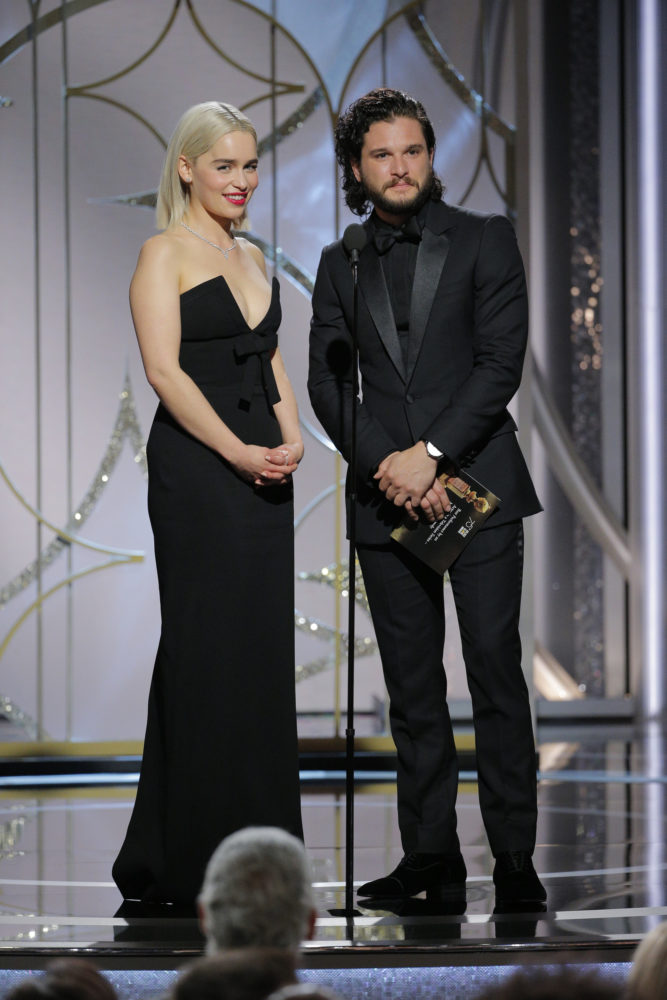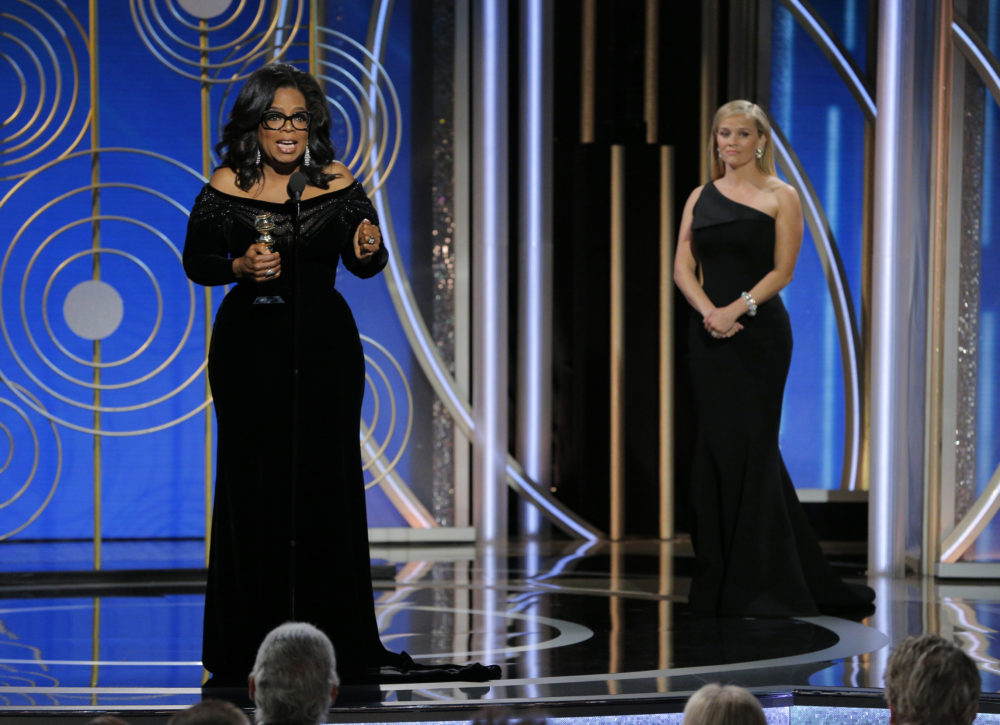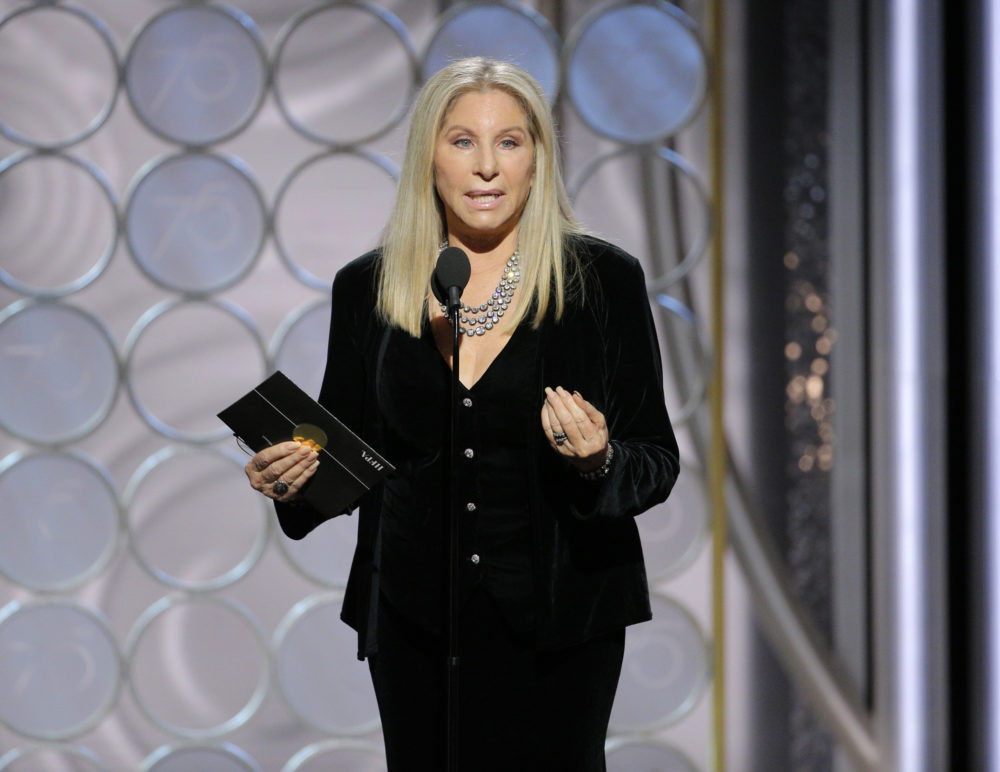“Time’s Up” at the Golden Globes
Anyone watching Sunday night’s annual Golden Globe Awards may have noticed a theme among the celebrities walking the red carpet. Almost every attendee wore some form of black.
This trend was due to the “Time’s Up” movement, started at the beginning of the year in response to last year’s #MeToo movement. It encourages equality among men and women in the workplace.
 Paul Drinkwater/NBC via AP
Paul Drinkwater/NBC via AP This image released by NBC shows presenters Emilia Clarke, left, and Kit Harington at the 75th Annual Golden Globe Awards in Beverly Hills, Calif., on Sunday, Jan. 7, 2018.
Many celebrities, including Mindy Kaling, posted pictures on Instagram of Time’s Up’s formal statement about wearing black to the awards show.
“For equity and parity across all industries. For safety among every worker in every occupation. For inclusion of all women and marginalized people,” Kaling wrote in her post.
In addition to wearing black, many celebrities brought advocates for equality as their plus-one.
Nominee Michelle Williams brought Tarana Burke, who founded the #MeToo movement to stop sexual harassment. Emma Watson was accompanied by activist Marai Larasi. Emma Stone brought former tennis player and female rights activist, Billie Jean King, whom she was nominated for portraying in “Battle of the Sexes.” King was one of the first female professional athletes to come out as homosexual, which provoked her fight for equality.
Instead of donning striking fashion designs, almost every attendee wore a black dress or tuxedo to show their support of the movement. Some even wore metal pins with the phrase “Time’s Up.”
Kerry Washington, from the ABC drama “Scandal” shared her view on the movement in an interview on the red carpet.
“These issues are not only issues in Hollywood. These are issues that are systematic. It’s about systemic toxicity across all industries,” she said. “So we decided to come together to say ‘Time’s Up’ on the imbalance of power. It’s time that women stand together across all industries.”
Among the most influential of the awards was the coveted Cecil B. Demille Award, which went to Oprah Winfrey. The award goes to someone chosen each year by the Hollywood Foreign Press Association for “outstanding contributions to the world of entertainment.”
 Paul Drinkwater/NBC via AP
Paul Drinkwater/NBC via AP This image released by NBC shows Oprah Winfrey accepting the Cecil B. DeMille Award as presenter Reese Witherspoon looks on, right, at the 75th Annual Golden Globe Awards in Beverly Hills, Calif., on Sunday, Jan. 7, 2018.
Winfrey devoted her acceptance speech to the importance of equality and safety in the workplace.
“Each of us in this room are celebrated because of the stories that we tell, and this year we became the story,” Winfrey said in reference to the outpouring of sexual harassment claims in Hollywood. “But it’s not just a story affecting the entertainment industry. It’s one that transcends any culture, geography, race, religion, politics, or workplace. So I want tonight to express gratitude to all the women who have endured years of abuse and assault because they, like my mother, had children to feed and bills to pay and dreams to pursue. They’re the women whose names we’ll never know. They are domestic workers and farm workers. They are working in factories and they work in restaurants and they’re in academia, engineering, medicine, and science. They’re part of the world of tech and politics and business. They’re our athletes in the Olympics and they’re our soldiers in the military.”
The rest of her speech can be found on YouTube.
 Paul Drinkwater/NBC via AP
Paul Drinkwater/NBC via AP This image released by NBC shows presenter Barbra Streisand at the 75th Annual Golden Globe Awards in Beverly Hills, Calif., on Sunday, Jan. 7, 2018.
Before presenting the award for best motion picture drama, Barbra Streisand talked about her own experience with inequality in Hollywood.
“I’m the only woman to get the best director award (at the Golden Globes). You know that was 1984 ― that was 34 years ago,” she said. “Folks, time’s up!”
—hannahjoycee00@gmail.com
@hannahjoyce

